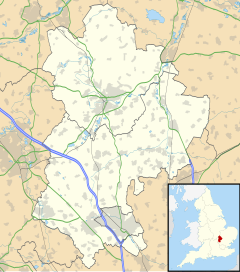Queens Park, Bedford
| Queens Park | |
|---|---|
 Guru Nanak Gurdwara in Queens Park |
|
| Queens Park shown within Bedfordshire | |
| Population | 7,688 8,552 (2011 Census. Ward) |
| OS grid reference | TL034495 |
| Unitary authority | |
| Ceremonial county | |
| Region | |
| Country | England |
| Sovereign state | United Kingdom |
| Post town | BEDFORD |
| Postcode district | MK40 |
| Dialling code | 01234 |
| Police | Bedfordshire |
| Fire | Bedfordshire and Luton |
| Ambulance | East of England |
| EU Parliament | East of England |
| UK Parliament | |
Queens Park is an electoral ward and area in Bedford, England. The area's borders are approximately Bromham Road and Beverley Crescent to the north, the Midland Main Line railway line to the east, and the River Great Ouse to the south.
Queens Park is a very diverse and multicultural area. This is reflected in the many specialist shops and businesses located in the community, including many international supermarkets and delis. There are also a varied number of places of worship, including an Anglican church, two mosques and the largest Sikh temple in the United Kingdom outside London.
The land in Queens Park was farmed as early as the 11th century, and occupied by tenant farmers. The only evidence of primitive settlements is the discovery of flint at Honey Hills. Early settlements and dwellings included; Provendor Farm, Prebend Farm, and the Farm House & cottages at Bedford Ford End (until the 1950s) now Fernleigh Close. Gallows existed up to 1802 at the sharp bend on the Bromham Road.
In 1890 W.H.Allen from London brought twenty acres of land west of Bedford town centre to establish his 'Queens Engineering Works', and housing for his employees. The works (opened in 1894) and the new community were named in honour of the queen of the day, Queen Victoria.
Queens Park has hosted many communities migrating to the Bedford area over the 20th century, firstly Irish and Italian families, followed by Asians, Africans, and most recently, people from Eastern Europe.
...
Wikipedia

